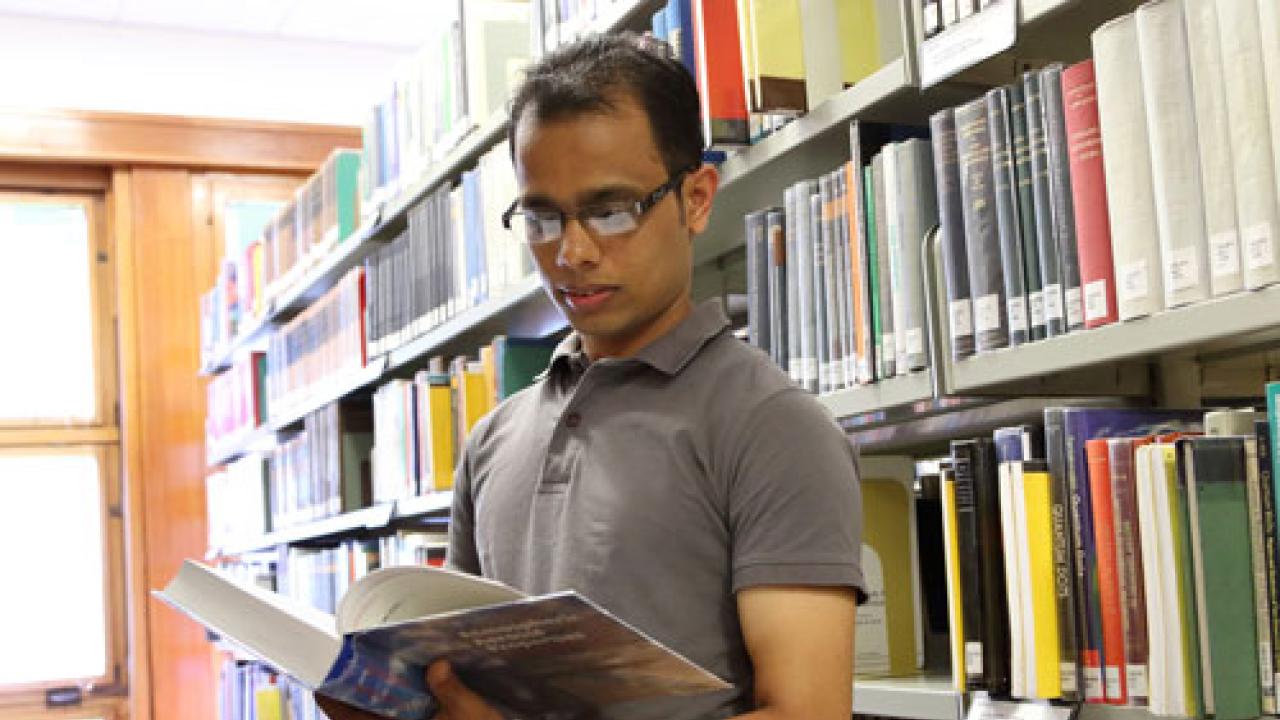
It's a long way from the village of Rithachaupata-08, Salkatya, Nepal, to Trieste, Italy, and it took many steps for ICTP Postgraduate Diploma student Janak Raj Joshi to get from one to the other. His journey started with a studious childhood, growing up a seven hours' walk from the nearest electricity source. Now about to graduate as one of the top Earth System Physics Diploma students, he is quite proud to be moving on to begin PhD studies in the United States, focusing on atmospheric sciences.
Nepalese who want to become scientists face daunting challenges. Power cuts for up to 18 hours a day make it hard to use a computer for anything, let alone physics simulations. While R&D investment by the government has risen, the density of researchers in the country is scant, and the percentage of women in science has fallen precipitously in the last decade from an already low beginning.
Joshi grew up in the impoverished region of Darchula in far western Nepal, in a village inaccessible by road and lacking electricity. Solar panels are now cutting into the darkness, but Joshi remembers using kerosene lamps to finish his studying. Most people in Joshi's village are not very educated, he explains: his parents' education stopped even without finishing primary school, and both of his older brothers completed secondary school before stopping. Joshi believes that a lack of role models, of scientists and others with tertiary education, is one of the reasons they did not continue with their studies. This is a big barrier to the growth of Nepalese science, he says.
But despite a lack of role models, Joshi placed well in regional exams, results that convinced his parents to send him for further education. "Maybe because I was very shy as a child, I mainly focused on my studies," Joshi remembers. That studiousness got him through the competitive entrance exams for Tribhuvan University in Kathmandu, the capital of Nepal, for his master's degree work. He graduated two years ago, and in the interim, he taught science to high school students in Kathmandu, while preparing for the GRE and TOEFL tests required by most graduate schools.
While he was studying for the tests, there was a massive earthquake centered in Kathmandu on 25 April 2015. "I cannot forget that, even now — I get afraid when the train goes by the ICTP buildings. I was on the fourth floor of a five-story building when the earthquake struck, and I did not imagine that I would survive," Joshi recalls. "I was okay, but I was kind of sad, and depressed, because many people were killed, many houses were useless." Joshi believes the recovery is going alright, even though everything is much more expensive than before the earthquake, and other factors, such as a blockade at the Indian border, complicate rebuilding.
The earthquake luckily did not change Joshi's plans to further his studies. "One of my professors encouraged me to apply to ICTP," Joshi says. "I was not the top student at Tribhuvan, and the concept was that only the top students can apply to ICTP. But after my professor urged me to apply, I was accepted here and I became happy."
Joshi is enthusiastic about his experience at ICTP, especially the way the Centre takes responsibility for the success of its students. "The ICTP family takes care of everything, from accommodation to meal coupons, to helping with difficulties,” he says, adding, "And professors are very helpful and up to date - this is very different from what I had before." The internet access and journal access are also highlights of Joshi's ICTP experience: "We did not have internet, even in the university, when I was doing my master's. It was very hard to study and keep up with research."
At ICTP, Joshi is completing the Earth System Physics Diploma course. His thesis focuses on aerosols, or particles, in Earth's atmosphere, with ICTP research scientist Fabien Solmon as his advisor. "Aerosols can cause many health issues, because the particles can be so small, as well as affect local and global climate patterns. We also study fluid dynamics to understand how these aerosols move and travel," says Joshi
"In the beginning I was not thinking of doing Earth system physics," remembers Joshi. "Even when I applied to ICTP I was not so sure that this field is beautiful, but now I have found that it is really beautiful science. These are studies of our Earth, which is our mother nature, and it has many impacts, such as climate change." This delight in Earth system physics and interest in the complexities of aerosols is what led Joshi to apply to a PhD program at the University of Maryland, Baltimore County, where he starts this August.
That exciting next step has Joshi thinking about what comes after a PhD. "After doing some postdocs in the US, I want to return to my country," he says. "I would like to establish research in aerosols and atmospheric physics there." But while this would be a boon to young Nepalese scientists and Nepalese science in general, it may not happen. "I would like to work in a university, but even if you are qualified, well qualified, you may not get the chance. That is a problem in our country, that's why people want to go to other countries. Not only from lack of funding, but also because people want to hire their people, their relatives — there's a lot of nepotism." He, and ICTP, hope that will change by the time Joshi returns home to inspire more young Nepalese scientists.
--Kelsey Calhoun
















